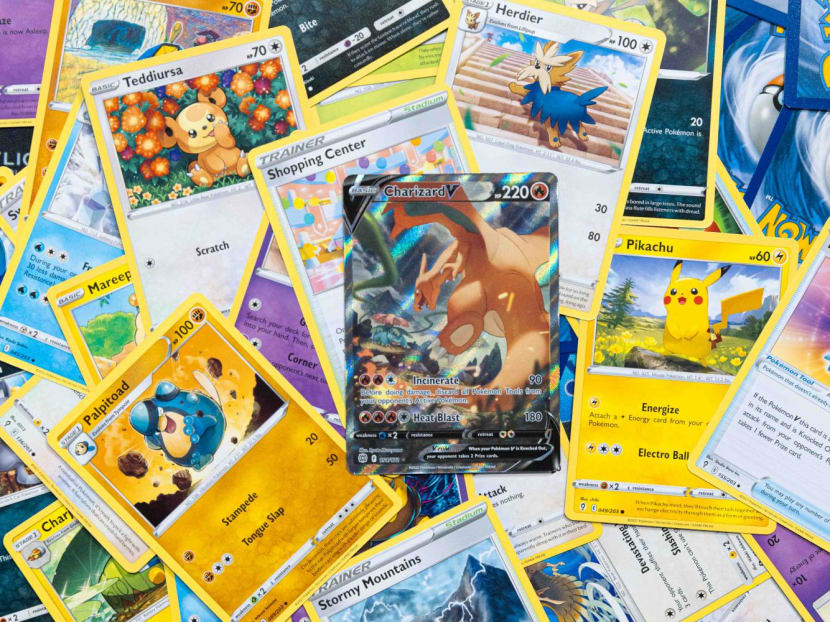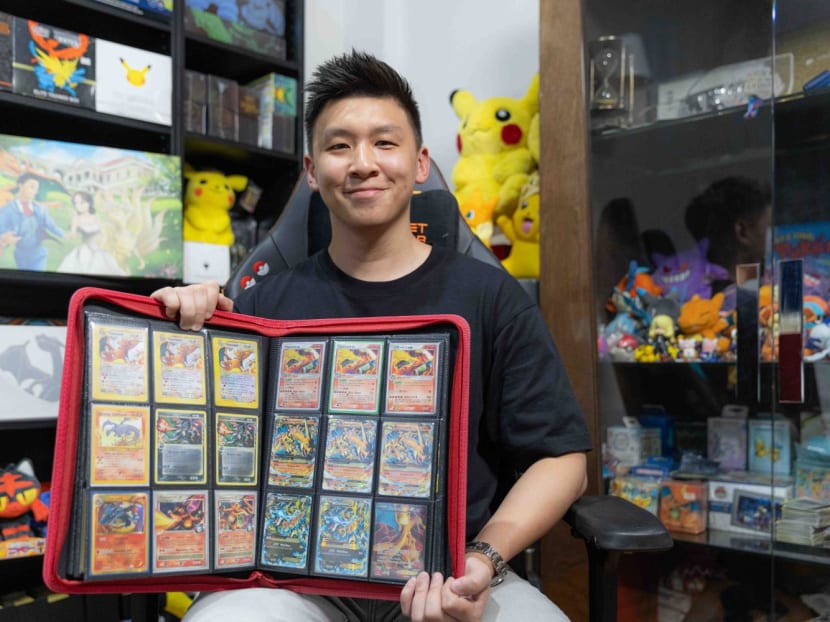Gotta buy 'em all: Rising popularity of Pokemon trading card game in Singapore attracting collectors... and also scammers
https://www.todayonline.com/singapore/pokemon-trading-card-game-collectors-scammers-2201266
Gotta buy 'em all: Rising popularity of Pokemon trading card game in Singapore attracting collectors... and also scammers

The Pokemon trading card game has seen a surge of interest in the past few years.
- The surge of interest in the Pokemon trading card game in the past few years means it is now possible to sell Pokemon cards full time, or as a side hustle
- Livestreamers have set up shop on TikTok, opening Pokemon card booster packs that viewers purchase online
- Given what Pokemon cards could be worth, the scene has not only attracted collectors but also scammers
- On June 22, a woman was sentenced to jail for swindling Pokemon card buyers of nearly S$217,000
- The owner of a Pokemon store said his customers had once been preyed upon by a scammer who used his store's name as part of a ruse
SINGAPORE — As he gets ready for another long day at work, Mr Roman Aymond boots up his computer, turns on his cameras and prepares his stock of Pokemon card booster packs before his virtual customers come streaming in.
The 29-year-old is a full-time streamer whose content revolves around him interacting with his audience while opening Pokemon card booster packs that viewers purchase online.
As customers’ purchases pour in, Mr Aymond carefully prepares each order and opens the purchased booster packs live on stream. He will then mail the cards to his customers.
Mr Aymond recalls one of his most memorable experiences on the job when he opened a booster pack containing a card with a potential estimated value of S$5,000.
“No one has managed to pull one in the modern day, even on YouTube. It went viral on the internet that we managed to pull a card like that in Singapore,” he said.
The Pokemon trading card game was originally released in 1996 in Japan.
While there are many Pokemon trading card game products, one of the most recognisable is the booster pack.
Each booster pack generally contains 10 random game cards of varying rarities, drawn from a particular set of cards depending on that booster pack’s theme.
Each pack contains at least one “rare” card.
Players often buy booster packs in hopes of obtaining a card of high monetary or sentimental value, also often referred to as “chase” cards.
Given what Pokemon cards could be worth, the scene has not only attracted collectors but also scammers.
Last week, a woman was sentenced to 31 months' jail for swindling Pokemon card buyers of nearly S$217,000.
The owner of a Pokemon store also told TODAY that his customers had once been preyed upon by a scammer who used his store's name as part of a ruse.

SURGE OF INTEREST
For collectors, the surge of interest in the game in the past few years means it is now possible to sell Pokemon cards full time, or as a side hustle.
Mr Aymond has casually collected Pokemon cards since he was six years old, before stopping when he turned 14.
A year and a half ago, however, he reignited his passion for the trading card game and began streaming his booster pack openings on the popular social media platform TikTok.
Eventually, Mr Aymond’s content started garnering more views, and he was approached by collectibles company Skylightz Collectibles to join its team as a full-time streamer on a separate streaming site, Twitch.
“Before Covid, a lot of people used to go to card shops and open packs with their friends. But with Covid restrictions, it became difficult to gather physically, so people started gathering online to open packs,” said Mr Aymond.
Upon seeing the growing trend of livestreamers selling Pokemon cards, Ms Sherry Lee, a 23-year-old Singapore Institute of Technology student, quickly set up a TikTok Shop of her own in May.
Ms Lee streams on weekday nights, into the wee hours of the morning, and makes roughly S$1 to S$1.50 per Pokemon card booster pack sold. With an average of 20 concurrent viewers per stream, she estimates her monthly profits to be around S$800.
“I try to research on the trends, on which chase card prices are going up, and try to procure booster packs from that particular set for the viewers,” she said.
“It is also important to keep interacting and building a relationship with your viewers. I treat it more like a friendship rather than a buyer-seller relationship.”

Mr Reuben Fong, a 32-year-old business development manager, is both a collector and player. He has been collecting Pokemon cards since he began playing the game in early 2012 and has spent an estimated S$200,000 to build his collection.
Mr Fong has also represented Singapore for the Pokemon Trading Card Game World Championships twice, in Hawaii in 2012 after winning the national championships, and then in Nashville in 2018.
Although he knows the value of his collection, Mr Fong said: “It will always be a hobby to me. I don’t see it as an investment. Today, if you told me that my collection had no value at all, I would still continue collecting it.”
The increasing value of cards has also led to a demand for highly priced cards to be professionally appraised, so as to truly assess a card's net worth.
Singapore-based card grading company Oxley Grading was set up in 2020 to meet this increasing need.
"When we started, grading services were not very well developed in Singapore. Players would simply hand over cards to card stores to be sent for grading. However, the entire process was not transparent," said a spokesperson from Oxley Grading.
The firm assists customers by sending their cards to internationally recognised card grading companies for professional appraisals.
They even help customers conduct an initial screening of their card to determine if the card is worth sending for such an appraisal.
Depending on the grading a card receives from the company, the value of the card will change.
Should a card receive the highest quality grading from a company, such as the "gem mint" condition, a card's value may nearly double in price, said a spokesperson from Oxley Grading.
HOW COLLECTORS BECOME SCAM VICTIMS
The value of Pokemon card collections is what attracts scammers, and Mr Teo Ming Yang, the 31-year-old owner of the physical card store Daimonji Collectibles, has had personal experience with this.
An acquaintance of his used the store’s name, as well as Mr Teo’s name, to collect deposits from the store’s customers for an upcoming product under the guise of assisting them with pre-orders.
The total amount the scammer collected was an estimated S$6,600.
“After a few months, a customer called to ask about the products and panicked when I confirmed that no such order had been placed,” Mr Teo said.
Fortunately, Mr Teo was able to track down the scammer and recover the stolen funds, and ultimately returned them to his customers.
There are many ways a Pokemon card collector can be the victim of a scam, some of which include:
- Pre-order/deposit scamming: Scammers collect deposits from buyers and claim to help them order products that will arrive at a later date
- Counterfeiting: Scammers procure fake cards and attempt to pass them off as authentic, to sell them to buyers
- Re-sealing booster packs: Scammers open sealed Pokemon card booster packs, remove the most valuable cards and replace them with cards of little to no value
“When it comes to doing their due diligence in verifying online sellers, people are lazy. Most consumers think that they will not be the victim of scams. If you are doing an online transaction, always make sure you double-check.” Mr Teo said.
When asked about how buyers can avoid scams, he believes that there is no foolproof solution and that there will always be scammers trying to prey on new and unsuspecting buyers.
“I think paying directly to the shop is always the best,” he said. “It’s hard for physical shops to just run with your money."
TODAY has reached out to the Consumers Association of Singapore and the police for comment.
Comments
Post a Comment